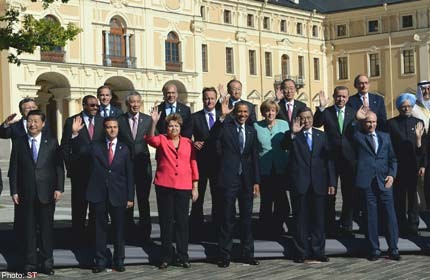Editorial: Nations should look beyond fears of tapering

SINGAPORE - The most pressing international issue which the recently concluded Group of 20 (G-20) summit addressed was the need to manage the economic impact arising from fears of a sudden winding down of the United States' massive financial stimulus measures.
G-20 leaders, including the US, sought to calm fears by pledging to remain mindful of the risks and unintended side effects of extended periods of monetary easing.
Developing economies, on their part, must understand that the tapering is necessary for the developed nations to put their economic house in order. The crucial test is whether the stimulus measures can be withdrawn in a way that does not destabilise the global economy.
Emerging economies could contribute by protecting themselves from the results of the precipitous drop in the flow of cheap funds from abroad. Singapore, as Prime Minister Lee Hsien Loong pointed out in Russia, has done so through policy measures such as cooling the overheated property market.
It is natural that this issue featured prominently at the parleys. Grouping 20 major economies, the G-20 was founded in 1999 in response to the financial crises in the late 1990s. It came into the limelight again after the global economic crisis of 2008, motivated by the need to create a framework for preventing future financial crises and achieving sustainable and balanced global growth.
Accounting for an astounding 90 per cent of the world's economy and two-thirds of its population, the G-20 indeed is well placed to strike a balance between the interests of the developed economies and others, including the major emerging economies of Brazil, Russia, India, China and South Africa.
Although there is no danger of a repeat of the 2008 crisis, the signals sent out at the St Petersburg summit should play a stabilising role.
Looking beyond these cyclical issues, there remains the main, structural challenge of ensuring growth and jobs in both the developed and developing economies. Globalisation and the dramatic spread of new technology are two forces which all countries are grappling with.
Investment in education that prepares the young to think for themselves is critical because this is the only way to prepare them for jobs that have not even come into existence. But social norms and politics, too, are being reshaped as globalisation gives countries a stake in one another's prosperity.
The challenge in the coming decades will be for nations to adapt to forces outside the control of even the most powerful countries.
In the final analysis, the age-old virtues of fiscal prudence, controlled spending and keeping taxes low are some of the ways in which countries can prepare to meet the common challenges of the times.

Get a copy of The Straits Times or go to straitstimes.com for more stories.